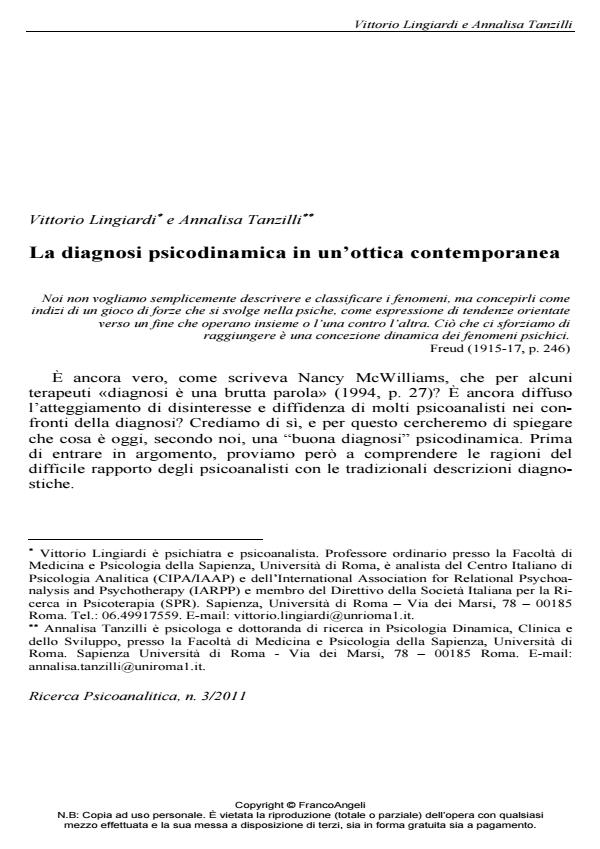Contemporary perspectives on psychodynamic diagnosis
Journal title RICERCA PSICOANALITICA
Author/s Vittorio Lingiardi, Annalisa Tanzilli
Publishing Year 2011 Issue 2011/3
Language Italian Pages 23 P. 9-31 File size 696 KB
DOI 10.3280/RPR2011-003002
DOI is like a bar code for intellectual property: to have more infomation
click here
Below, you can see the article first page
If you want to buy this article in PDF format, you can do it, following the instructions to buy download credits

FrancoAngeli is member of Publishers International Linking Association, Inc (PILA), a not-for-profit association which run the CrossRef service enabling links to and from online scholarly content.
The most widely used diagnostic classification manuals such as the International Classification of Diseases (ICD; see World Health Organization, WHO, 1992) and the Diagnostic and Statistical Manual of Mental Disorders (DSM; see American Psychiatric Association, APA, 2000), in their various editions, are based on a descriptive, atheoretic and substantially symptom-behavior oriented approach to psychopathology. This approach aroused various reactions in psychodynamic clinicians: disinterest, dissatisfaction, distrust, or even rejection. The appearance of assessment procedures and psychodynamic diagnostic manuals, well grounded in empirical research [such as the Shedler-Westen Assessment Procedure-200 (SWAP-200; Westen, Shedler, 1999a, b; Westen, Shedler, Lingiardi, 2003) and the Psychodynamic Diagnostic Manual (PDM; PDM Task Force, 2006), promoted a "cultural revolution" in the community of mental health professionals, emphasizing an approach to diagnosis closer to clinical practice and more consistent with psychotherapeutic interventions. There, diagnosis is not only a label, but also an evaluation process that links symptoms to personality context and leads to patient-tailored treatments.
Keywords: Psychodinamic diagnosis, psycopathology, SWAP, PDM, DSM
Vittorio Lingiardi, Annalisa Tanzilli, La diagnosi psicodinamica in un’ottica contemporanea in "RICERCA PSICOANALITICA" 3/2011, pp 9-31, DOI: 10.3280/RPR2011-003002